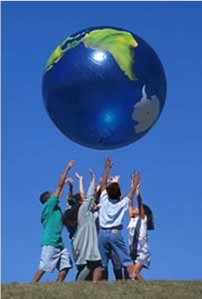Diversity, Technology, and a Jigsaw

A WebQuest
for
Teaching Reading and Writing in World Languages
Introduction / Tasks / Process / Resources / Evaluation / Conclusion / Homepage

You may be asking: A web what?
A WebQuest is an online lesson that includes specific tasks, processes, resources, a measure of evaluation, and a conclusion. It can be either a short lesson designed to help learners acquire new knowledge or a longer lesson that asks learners to use newly acquired knowledge to analyze, synthesize and evaluate their own learning. Although WebQuests can be done by individual students, most are designed for discovery learning in small groups. There are two important features that distinguish WebQuests from traditional research assignments. The tasks simulate real-life situations and the information needed to complete the tasks comes predominantly from internet resources.
EDRD 620: A WebQuest Using a Jigsaw Activity
The purpose of this project is two-fold. First, through discovery learning, you will learn how to use a WebQuest as a pedagogical tool. As you proceed through this WebQuest, think about the tasks, processes, resources, and evaluations that are included. How might the activities appeal to the cognitive, linguistic, and cultural diversity of today's language learners? How might you be able to use something similar in your own teaching? Second, you will enhance your knowledge of the major topics in this course by completing a jigsaw activity. With jigsaw activities, each small group is asked to investigate a specific topic (a piece of the jigsaw) in order to become "the experts." Once the group has completed its investigation, the members will report their findings in a 20-minute Power Point presentation. As the groups shares their findings, the pieces of the jigsaw are put in place to form "the whole puzzle" of EDRD 620.
Return to top

Scenario: Your school's world language department has been selected by the district supervisor to host a workshop titled, "Reading and Writing in World Languages." It seems that for the last decade, the teaching of reading and writing skills has been overshadowed by a strong focus on the development of speaking and listening skills. Because of this, many world language instructors through out the district are not aware of the current standards-based, research-driven methods and tools for teaching reading and writing in the target language. The district supervisor would like your department to present the "latest and greatest" information on the following four areas: The ACTFL Standards, Reading and Writing Strategies, Multimedia Technologies, and Performance-based Assessments.
Your department chairperson has asked you to work in small groups. Each group will become an expert on one of the given topics. Each member will be responsible for his/her individual investigation. Group members will then converge to analyze and synthesize their findings in order to produce a 20-minute oral presentation using Microsoft Power Point. All group members are expected to participate in the oral presentation. You may make your presentation as interactive as you'd like.
Return to top

To learn the specific process for your group, please scroll down to your topic. You should familiarize yourself with the details of what you need to do. Then, continue on to the section for resources, where you will find a list of useful links specifically for your topic.
Group 1: Standards of World Language Learning: The ACTFL 5Cs
Each member of this group will:1. Review the "Standards of World Language Learning" that were established by the American Council for the Teaching of Foreign Languages (ACTFL). When and why were they originally established? Upon what corpus of literature in educational research are they based? By comparing individual notes, your group should provide a brief summary of the standards (the 5Cs).
2. Watch 2 Annenberg videos on the teaching of world languages (each member is to select 2). What evidence is there of the 5Cs in each video? How were the 5Cs applied to reading and/or writing in a foreign language? How did instruction address the cognitive, linguistic, and cultural diversity of the students? What suggestions do you have for improving the lesson?
3. Use Microsoft Power Point to create slides with your individual findings of the video reviews. You should collaborate with your group members in order to include a few summary slides. These summary slides should show evidence of analysis and synthesis of the individual findings among all group members.
4. Familiarize yourself with the grading rubric for this project.
Group 2: Research on Reading and Writing Strategies
Divide the group in two: "Reading Strategy Researchers" and "Writing Strategy Researchers"
Each member of this group will:1. Conduct research using the links in "Resources" (see below). You may use other resources, but they must be from an academic source that is based on sound pedagogy. As you conduct your research, be sure to define the major strategies for reading and writing in a foreign language and why they are useful. For teaching reading, you should investigate pre-reading, during-reading, and post-reading strategies and provide examples of each. For teaching writing, you should focus on process-oriented writing strategies such as pre-writing, writing, and re-writing and provide examples of each.
2. Watch one of the selected Annenberg videos on reading and writing (selected videos are listed in the "Resources" below). How were reading and/or writing strategies used in the video lesson? How did instruction address the cognitive, linguistic, and cultural diversity of the students? What suggestions do you have for improving the lesson?
3. Use Microsoft Power Point to create slides with your individual findings of the reading/writing strategies as well as the video reviews. You should collaborate with your group members in order to include a few summary slides. These summary slides should show evidence of analysis and synthesis of the individual findings among all group members.
4. Familiarize yourself with the grading rubric for this project.
Group 3: Multimedia, Wikis, and Blogs
Assign one of the technologies to each group member to investigate.
Each member of this group will:1. Research your assigned technology in order to describe what it is, how it works, and how it might be applied to reading and writing in a world language.
2. Include 2 examples for application. One question to keep in mind: How would your proposed applications of this technology appeal to the age, language level, and the cognitive, linguistic, and cultural diversity of the learners?
3. Use Microsoft Power Point to create slides with your individual findings. You should collaborate with your group members in order to include a few summary slides. These summary slides should show evidence of analysis and synthesis of the individual findings among all group members.
4. Familiarize yourself with the grading rubric for this project.
Group 4: Performance-based and Alternative Assessments
Each member of this group will:1. Review the current research on performance-based and alternative assessments. What are these assessments and what corpus of literature supports their application for reading and writing in the PK-12 world language classroom? By comparing individual notes, your group should provide a brief summary of performance-based, alternative assessments.
2. Provide 2 examples (different from those of your group members) of alternative assessment tasks and how the teacher would evaluate the student's performance. The examples should highlight different languages, language levels and grade levels. How do these examples address the cognitive, linguistic, and cultural diversity of world language learners?
3. Use Microsoft Power Point to create slides with your individual findings. You should collaborate with your group members in order to include a few summary slides. These summary slides should show evidence of analysis and synthesis of the individual findings among all group members.
4. Familiarize yourself with the grading rubric for this project.
Return to top

Please scroll down to your group's topic to find a list of useful resources. You may use other resources but they must be grounded in sound pedagogical principles and/or educational research. If your process includes video reviews, be sure to access the videos using the link to the Annenberg site.
Group 1: Standards of World Language Learning: The ACTFL 5Cs
1. Visit the ACTFL web site to download information on the 5Cs at: http://www.actfl.org/i4a/pages/index.cfm?pageid=3324
2. Additional information on the ACTFL standards can be found at: http://www.cal.org/resources/archive/news/2002fall/standards.html
http://filebox.vt.edu/users/isaavedr/Standards.htm3. The Annenberg video library requires a membership. Please take a few minutes to join (no cost) in order to access the video library at: http://www.annenbergmedia.org/resources/series185.html
Group 2: Research on Reading and Writing Strategies
1. General information on reading strategies can be found at:
http://readingquest.org
http://nflrc.hawaii.edu/rfl
http://www.nclrc.org/essentials/index.htm2. Web sites that contain information on process writing strategies can be found at: http://www.angelfire.com/wi/writingprocess/prewriting.html
http://www.planet.eon.net/~bplaroch/indexb.html
http://www.nclrc.org/essentials/index.htm (this site may be under construction)3. To access an article that combines second language reading and writing, go to:
http://www.ncela.gwu.edu/pubs/nysabe/vol10/nysabe103.htm4. The Annenberg video library requires a membership. Please take a few minutes to join (no fee) in order to access the video library at: http://www.annenbergmedia.org/resources/series185.html
NOTE:
Each group member is to select one of the following videos:
#7: Holidays and Seasons (German Reading and Writing)
#25: Russian Cities, Russian Stories (Russian Reading and Writing)
#11: Communicating About Sports (Chinese Reading and Writing)
#28: Creating Travel Advice (Spanish Reading and Writing)Group 3: Multimedia, Wikis, and Blogs
1. Search for Articles (use key words such as blogs, wikis, or multimedia) on technology and language learning at:
http://llt.msu.edu
http://nflrc.hawaii.edu/rfl2. For Multimedia:
http://llt.msu.edu/vol2num1/pdf/net.pdf (LeLoup & Ponterio Article)
http://www.quia.com (sign up for free 30-day trial)
http://www.apples4theteacher.com/foreignlang.html
http://www.languagegames.org/la
http://www.cortland.edu/flteach/flteach-res.html
http://www.colby.edu/~bknelson/exercises (Spanish only)
http://www.kidsolr.com/language_arts/page5.html
http://www.chinese-tools.com
3. For Wikis:
http://www.frenchteachers.org/technology/includes/extras/what_in_the_wiki.html
http://teachwtech.blogspot.com/2006/03/k-12-wiki-resources.html
http://k12onlineconference.org/?p=384. For Blogs:
http://iteslj.org/Techniques/Meloni-Email.html
http://teachwtech.blogspot.com/2006/02/k-12-blogging-resources.html
http://k12onlineconference.org/?s=blogsGroup 4: Performance-based and Alternative Assessments
Information and examples of alternative, performance-based assessments can be found at: http://jonathan.mueller.faculty.noctrl.edu/toolbox/whatisit.htm (Jon Mueller Site)
http://www.cal.org/resources/digest/hancoc01.html (Charles Hancock Article)
http://pareonline.net/getvn.asp?v=2&n=2 (Grant Wiggins Article)
http://gse.gmu.edu/research/mirs/ (Dr. Marjorie Hall Haley's Multiple Intelligences Research)
http://www.nclrc.org/essentials/index.htm (National Capital Language Resource Center)
http://www.fcps.edu/DIS/OHSICS/forlang/PALS/rubrics/ (Fairfax County's FL performance-based assessment rubrics for speaking and writing)
Return to top

Your individual final grade is based upon:
1. How well you completed the process for your topic
2. How well you collaborated with your group members to provide a cohesive, professional presentation
The rubric can be accessed here. Please print a copy and give it to your instructor on the day of your presentation.
Return to top

As you work through your licensure coursework, you should look for examples of good teaching and learning. These examples may come from your instructors, but you should also be aware that the cognitive, linguistic, and cultural diversity of your colleagues is a tremendous source for understanding how individuals learn. This project was designed so that you could experience the use of technology in discovery learning as well as the jigsaw activity. Before moving on to the next project in this course, you should take time to reflect upon the following:
How did discovery learning take place?
How can WebQuests meet the cognitive, linguistic, and cultural diversity of individual learners?
How might a WebQuest or jigsaw activity address the different learning styles and multiple intelligences?
How might you develop a WebQuest or jigsaw activity that includes reading and writing strategies and assessments?
Return to top
